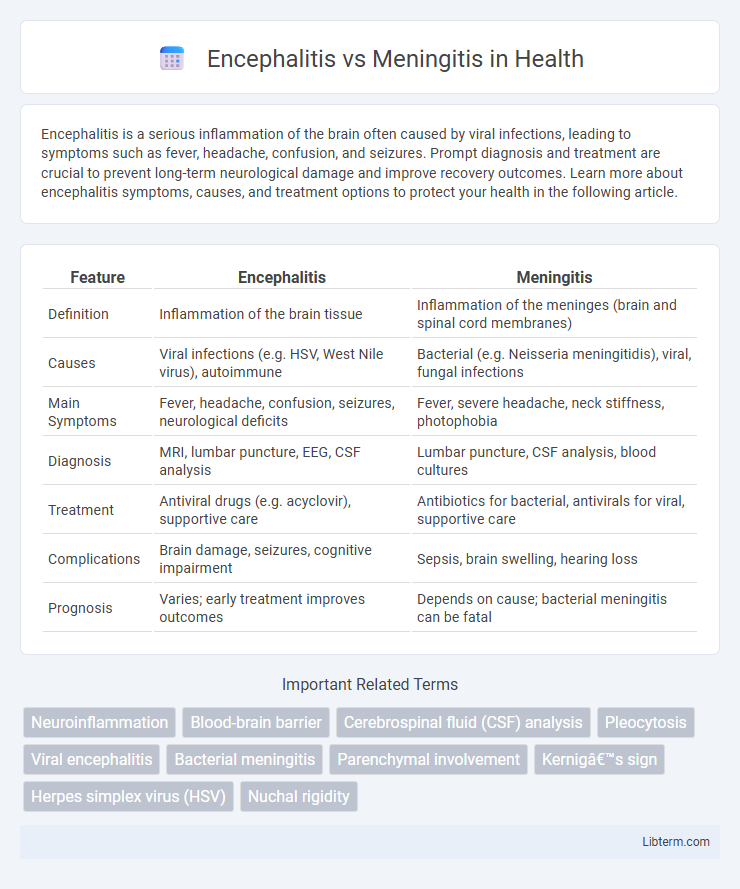Encephalitis is a serious inflammation of the brain often caused by viral infections, leading to symptoms such as fever, headache, confusion, and seizures. Prompt diagnosis and treatment are crucial to prevent long-term neurological damage and improve recovery outcomes. Learn more about encephalitis symptoms, causes, and treatment options to protect your health in the following article.
Table of Comparison
| Feature | Encephalitis | Meningitis |
|---|---|---|
| Definition | Inflammation of the brain tissue | Inflammation of the meninges (brain and spinal cord membranes) |
| Causes | Viral infections (e.g. HSV, West Nile virus), autoimmune | Bacterial (e.g. Neisseria meningitidis), viral, fungal infections |
| Main Symptoms | Fever, headache, confusion, seizures, neurological deficits | Fever, severe headache, neck stiffness, photophobia |
| Diagnosis | MRI, lumbar puncture, EEG, CSF analysis | Lumbar puncture, CSF analysis, blood cultures |
| Treatment | Antiviral drugs (e.g. acyclovir), supportive care | Antibiotics for bacterial, antivirals for viral, supportive care |
| Complications | Brain damage, seizures, cognitive impairment | Sepsis, brain swelling, hearing loss |
| Prognosis | Varies; early treatment improves outcomes | Depends on cause; bacterial meningitis can be fatal |
Overview: Understanding Encephalitis and Meningitis
Encephalitis and meningitis are serious neurological conditions caused by inflammation of the brain and the protective membranes surrounding it, respectively. Encephalitis typically results from viral infections such as herpes simplex virus, leading to brain swelling and neurological symptoms including confusion, seizures, and altered consciousness. Meningitis, often bacterial or viral in origin, affects the meninges and presents with symptoms like severe headache, neck stiffness, fever, and sensitivity to light, requiring immediate medical intervention to prevent complications.
Key Differences Between Encephalitis and Meningitis
Encephalitis primarily involves inflammation of the brain tissue, whereas meningitis affects the protective membranes surrounding the brain and spinal cord, known as the meninges. Symptoms of encephalitis often include altered mental status, seizures, and neurological deficits, while meningitis typically presents with headache, neck stiffness, and fever. Diagnostic differentiation is achieved through lumbar puncture, where cerebrospinal fluid analysis reveals distinct patterns of infection for viral or bacterial causes in meningitis and inflammatory markers or brain imaging abnormalities indicate encephalitis.
Causes: Viral, Bacterial, and Other Triggers
Encephalitis is primarily caused by viral infections such as herpes simplex virus, arboviruses, and enteroviruses, while bacterial causes like Neisseria meningitidis and Streptococcus pneumoniae are more common in meningitis cases. Other triggers include autoimmune responses and fungal infections, which can provoke inflammation in the brain or meninges. Rapid identification of these causative agents is crucial for effective treatment and reducing neurological complications.
Symptoms: Encephalitis vs Meningitis Warning Signs
Encephalitis symptoms include fever, severe headache, confusion, seizures, and neurological deficits such as weakness or sensory disturbances. Meningitis commonly presents with fever, neck stiffness, headache, nausea, and sensitivity to light (photophobia). Early recognition of encephalitis or meningitis warning signs is critical for prompt medical intervention and improved outcomes.
Diagnosis: Identifying the Right Condition
Encephalitis and meningitis require precise diagnosis through clinical evaluation, imaging, and laboratory tests to differentiate between brain inflammation and meningeal infection. Lumbar puncture with cerebrospinal fluid analysis is critical for detecting viral or bacterial pathogens, supporting targeted treatment. MRI scans help identify brain tissue involvement in encephalitis, whereas meningitis typically shows meningeal enhancement, guiding appropriate medical interventions.
Risk Factors and Populations at Risk
Encephalitis primarily affects individuals exposed to viral infections like herpes simplex virus, West Nile virus, or tick-borne encephalitis, with immunocompromised people, young children, and the elderly at higher risk. Meningitis risk factors include bacterial, viral, or fungal infections, crowded living environments, and lack of vaccination, disproportionately impacting infants, adolescents, and those with weakened immune systems. Both conditions show increased prevalence in populations with poor access to healthcare and sanitation, emphasizing the importance of preventive measures in high-risk groups.
Treatment Approaches for Encephalitis and Meningitis
Treatment approaches for encephalitis typically involve antiviral medications such as acyclovir, especially when caused by herpes simplex virus, along with supportive care to manage symptoms like seizures and swelling. In contrast, bacterial meningitis requires prompt administration of intravenous antibiotics and sometimes corticosteroids to reduce inflammation, while viral meningitis often resolves with supportive care and rest. Early diagnosis and targeted therapy are critical in both conditions to prevent complications and improve patient outcomes.
Complications and Long-Term Effects
Encephalitis commonly leads to neurological complications such as cognitive impairments, seizures, and personality changes, while meningitis primarily causes hearing loss, brain damage, and hydrocephalus. Long-term effects of encephalitis often include memory deficits and motor dysfunction, whereas meningitis survivors may experience chronic headaches and learning disabilities. Both conditions require prompt treatment to reduce the risk of permanent brain damage and disability.
Prevention Strategies and Vaccination
Vaccination remains the most effective prevention strategy for both encephalitis and meningitis, with vaccines targeting pathogens like Haemophilus influenzae type b (Hib), Neisseria meningitidis, Streptococcus pneumoniae, and the Japanese encephalitis virus. Maintaining proper hygiene practices, including frequent handwashing and avoiding close contact with infected individuals, reduces transmission risk. Vector control measures, such as using insect repellents and bed nets, are crucial in preventing mosquito-borne encephalitis infections.
When to Seek Medical Attention
Seek medical attention immediately if symptoms such as severe headache, high fever, neck stiffness, confusion, seizures, or sensitivity to light appear. Encephalitis and meningitis both require prompt diagnosis and treatment to prevent serious complications or death. Early intervention with appropriate antiviral or antibacterial therapy significantly improves patient outcomes and reduces the risk of long-term neurological damage.
Encephalitis Infographic

 libterm.com
libterm.com